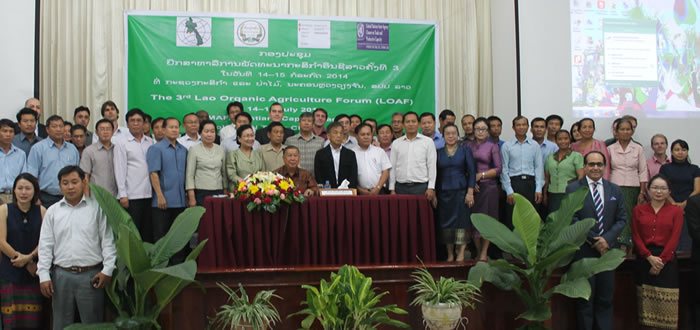The Third Lao Organic Agriculture Forum (LOAF 3), jointly organized by UNCTAD and the ministries of Agriculture and Forestry, and Industry and Commerce of the Lao People's Democratic Republic (Lao PDR), took place in Vientiane in July.
The event formed part of an ongoing project to enhance sustainable tourism, clean production and export capacity in the Lao PDR. The project is funded by the State Secretariat for Economic Affairs of Switzerland (SECO), within the framework of the UN Inter-Agency Cluster on Trade and Productive Capacity.
The forum was opened by Minister of Agriculture and Forestry Vilayvanh Phomkhe and attended by 80 key stakeholders from the public sector and private sector, including farmers. The two-day event was closed by Director-General of the Department of Agriculture Monthathip Chanphengxay.
The event presented an opportunity for stakeholders interested in organic agriculture development in Lao PDR to share information and experience, and discuss future directions in the organic agriculture market. It also provided a forum where information about such issues as traceability and standards could be shared and where linkages with the tourism industry could be explored by representatives of civil society, the public and private sectors. Previous LOAF events took place in March and December 2012.
At LOAF 3, the exchange of experiences was enhanced to include those of other countries - namely Uganda and Thailand - different agricultural sectors (for example bioenergy). Possible anti-competitive issues were also examined.
Participants identified challenges and opportunities as well as suggested ways forward in expanding organic production in the Lao PDR, and looked into three key areas: policy issues, technical support, and public relations and dissemination.
Coordination and collaboration among the government, businesses and international organizations need to be strengthened, participants agreed. Furthermore, in addressing the weakest links in the organic value chain, the knowledge and understanding of producers need to be enhanced while the skills of farmers need to be improved. Better coordination could be achieved by the establishment of a committed management team, the forum heard.
Other ideas included:
The integration of organic agriculture into the government's ministerial structure
The introduction of affordable financing for farmers who prove they can develop and market organic produce in a profitable way
The establishment of organic agriculture courses in Laotian vocational schools to train young people in its techniques
The establishment of an association which links producers in different parts of Lao PDR and the collection and sharing of market information among them and with the government
The provision of better information for farmers about the distinctions between organic farming and traditional agricultural practices
The findings of an UNCTAD study on tourism development in the Lao PDR and inter-sectoral linkages with organic agriculture were presented at the forum. The study, entitled "Lessons Learned from around the World on Enhancing Backward Linkages of Organic Products to the Tourism Industry", will be published by UNCTAD in October 2014.
Participants called for continuing LOAF events and for the government to establish it as a national annual event.
Government representatives said that the suggestions arising from LOAF 3 would be taken into consideration in drafting future government legislation in the area of organic agriculture.

